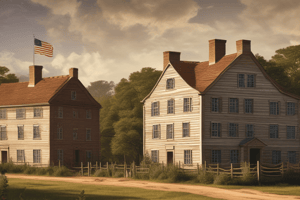Podcast
Questions and Answers
What was the primary reason for discontent among the white colonists regarding British rule?
What was the primary reason for discontent among the white colonists regarding British rule?
- Restrictions on land ownership
- Colonial governance structures
- High taxation without representation (correct)
- Impositions on trade practices
How did the British monarchy's actions after the war affect the colonial elites' push for independence?
How did the British monarchy's actions after the war affect the colonial elites' push for independence?
- They provided significant military support to the colonists.
- They encouraged the colonists to unite against indigenous tribes.
- They imposed heavy taxation and restricted land acquisition. (correct)
- They promised greater autonomy for the colonies.
What was the significance of having a written constitution with limited powers?
What was the significance of having a written constitution with limited powers?
- It created a potentially more accountable government. (correct)
- It allowed for a lifetime tenure in office.
- It encouraged authoritarian rule.
- It imposed property qualifications for officeholders.
Which provision was included in Article VI regarding qualifications for federal officeholders?
Which provision was included in Article VI regarding qualifications for federal officeholders?
What strategy did the colonial elite use to redirect popular anger away from their own privilege?
What strategy did the colonial elite use to redirect popular anger away from their own privilege?
What was a key factor in the conflict between colonial elites and the British monarchy?
What was a key factor in the conflict between colonial elites and the British monarchy?
What type of laws were prohibited by the new constitution in relation to individual rights?
What type of laws were prohibited by the new constitution in relation to individual rights?
Which event highlighted the class tensions among the colonists during the march towards independence?
Which event highlighted the class tensions among the colonists during the march towards independence?
What was the aim of the Bill of Rights that was promised during the ratification of the Constitution?
What was the aim of the Bill of Rights that was promised during the ratification of the Constitution?
What challenge faced the colonial elite in mobilizing support for independence?
What challenge faced the colonial elite in mobilizing support for independence?
What does the Constitution establish regarding government power?
What does the Constitution establish regarding government power?
What change was implemented regarding the compensation of federal officials?
What change was implemented regarding the compensation of federal officials?
Which of the following amendments is NOT included in the first ten amendments known as the Bill of Rights?
Which of the following amendments is NOT included in the first ten amendments known as the Bill of Rights?
What was a significant outcome of the colonists' frustrations with British authority?
What was a significant outcome of the colonists' frustrations with British authority?
What is referred to as the 'supreme law of the land'?
What is referred to as the 'supreme law of the land'?
What was the impact of the costly war on the British monarchy's policy towards the colonies?
What was the impact of the costly war on the British monarchy's policy towards the colonies?
Who ultimately decides questions and conflicts about laws in violation of the federal Constitution?
Who ultimately decides questions and conflicts about laws in violation of the federal Constitution?
The decision in Torcaso v. Watkins was significant because it addressed what issue?
The decision in Torcaso v. Watkins was significant because it addressed what issue?
What characterizes the terms of office for the president and legislators under the new government structure?
What characterizes the terms of office for the president and legislators under the new government structure?
How does the flexibility of the Constitution manifest over time?
How does the flexibility of the Constitution manifest over time?
What is one purpose of the Constitution highlighted in the preamble?
What is one purpose of the Constitution highlighted in the preamble?
What does the term 'posterity' refer to in the context of the Constitution?
What does the term 'posterity' refer to in the context of the Constitution?
Why is the Constitution described as having been designed to allow only slow, incremental change?
Why is the Constitution described as having been designed to allow only slow, incremental change?
What might be a consequence of the Constitution's flexibility?
What might be a consequence of the Constitution's flexibility?
What is the main purpose of the powers granted to Congress in Section 8?
What is the main purpose of the powers granted to Congress in Section 8?
Which clause in Section 8 provides for implied powers?
Which clause in Section 8 provides for implied powers?
What did the Supreme Court conclude regarding Congress's power to build a bank?
What did the Supreme Court conclude regarding Congress's power to build a bank?
What principle did the Court affirm regarding the state of Maryland's attempt to tax the national government?
What principle did the Court affirm regarding the state of Maryland's attempt to tax the national government?
Which of the following is NOT an enumerated power of Congress listed in Section 8?
Which of the following is NOT an enumerated power of Congress listed in Section 8?
What does the term 'forgoing powers' refer to in the context of Section 8?
What does the term 'forgoing powers' refer to in the context of Section 8?
Why did the Supreme Court believe that Congress had the power to build a bank?
Why did the Supreme Court believe that Congress had the power to build a bank?
Which of the following actions is considered not uniformly executed across the United States based on Section 8?
Which of the following actions is considered not uniformly executed across the United States based on Section 8?
What does the concept of the 'imperial presidency' suggest about the presidency's role in foreign policy?
What does the concept of the 'imperial presidency' suggest about the presidency's role in foreign policy?
Which action did President Obama take that exemplified the 'imperial presidency' concept?
Which action did President Obama take that exemplified the 'imperial presidency' concept?
How did the framers of the Constitution attempt to limit the concentration of power within the government?
How did the framers of the Constitution attempt to limit the concentration of power within the government?
What controversy has arisen post-World War II regarding the presidency?
What controversy has arisen post-World War II regarding the presidency?
In what way did President Bush's actions reflect concepts associated with an 'imperial presidency'?
In what way did President Bush's actions reflect concepts associated with an 'imperial presidency'?
What reason has been given for delegating military and national security decisions to the executive branch?
What reason has been given for delegating military and national security decisions to the executive branch?
What aspect of President Trump's approach was aligned with the concept of an 'imperial presidency'?
What aspect of President Trump's approach was aligned with the concept of an 'imperial presidency'?
What power did President Bush assert regarding national security that involved implications on civil liberties?
What power did President Bush assert regarding national security that involved implications on civil liberties?
Flashcards are hidden until you start studying
Study Notes
Colonial Settlers and Independence
- Early settlements began as charters granted to European corporations funded by different monarchies.
- White colonists grew discontent with British control, fueled by restrictions on land ownership and rising taxes.
- Although the monarchy prohibited land acquisition from indigenous communities, white elites sought such expansion.
- While the colonial elite maneuvered to gain independence, they also aimed to control widespread popular anger against the wealthy.
- The aim was to direct the anger towards British rule and away from the colonial elites themselves.
The US Constitution
- The Constitution was designed with limited powers, making it potentially more accountable than European systems.
- It provided salaries for all federal officials, unlike previous practices that relied on wealthy individuals for service.
- It prohibited religious qualifications for holding federal office, though some states maintained such restrictions until 1961.
- The Constitution prohibits bills of attainder (punishing individuals without trial) and ex post facto laws (retroactive punishment).
- A Bill of Rights was added, ensuring freedoms like speech, religion, assembly, and the right to bear arms.
Key Constitutional Concepts
- Article VI establishes the Constitution as the "supreme law of the land," with federal courts ultimately deciding disputes.
- The Constitution's flexibility, particularly through Supreme Court decisions, ensures its adaptability in response to societal changes.
- The Preamble aims to secure liberty for current and future generations.
The Necessary and Proper Clause
- Article 1, Section 8 grants Congress specific powers, including collecting taxes and regulating commerce.
- The "necessary and proper" clause extends Congress's authority to enact laws to carry out its enumerated powers.
- The Supreme Court in McCulloch v. Maryland ruled that Congress's power to coin money implied the power to build a national bank.
The "Imperial Presidency"
- The President's role as Commander-in-Chief has evolved to become a dominant voice in foreign affairs.
- The "imperial presidency" concept suggests that the Presidency may exceed its constitutional powers regarding national security.
- Concerns have arisen regarding the executive branch's growing control over foreign policy and military use.
Checks and Balances
- Checks and balances were implemented to prevent power concentration in any single branch of government.
- This system empowers each branch to oversee the others and encourages cooperation between them.
Studying That Suits You
Use AI to generate personalized quizzes and flashcards to suit your learning preferences.




